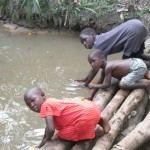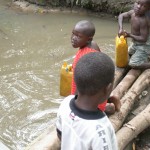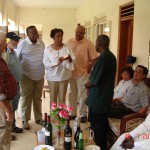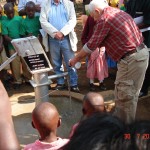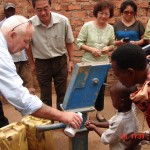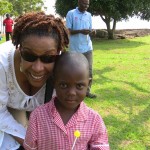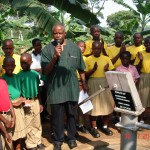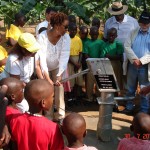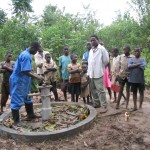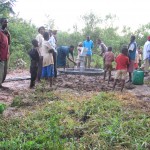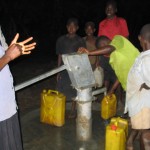A Pilgrimage of Pain and Hope – UGANDA [5]
“Jacob’s well is there and Jesus, tired by the journey, sat straight down by the well. It was about the sixth hour. When a Samaritan woman came to draw water, Jesus said to her, ‘Give me a drink.’” [John 4:6-7]
[1] Jesus and the Samaritan woman at Jacob’s well. [2 & 3] Children collecting water from a mud hole .
Water is life.
Tired from the morning’s journey, Jesus asked a woman in Samaria for a drink of water to sustain His human life. “Give me a drink” is a word from the Lord to remind us of our obligations in fresh water ministry.
Scientists checking out the sustainability of life on any distant planet look for the presence of water as an affirmative indicator.
Somehow, the ancient inspired writer of the Book of Genesis seemed so conditioned by the human need for water that even as he described the earth as being a “formless void”, he gave a vivid portrayal of the Spirit of God “moving over the face of the waters” ready to begin the work of creating the universe (Gen 1:2).
When we run the references to water (or derivatives of it) in the Bible, we will come up with at least 722 hits. Water is clearly a key concern for Christians. Amongst its many usages in Scriptures, water speaks of physical (or natural) birth, of the word of God, of the purification of the Christian, and of spiritual life.
And in the theology on the sacraments, we know the crucial importance of water. God gives us the Holy Spirit through water baptism, so that to be baptized in water is to undergo Pentecost as well.
And yet, water in its scarcity is such a precious commodity in one part of the world while, at the same time, in its abundance is taken for granted in another corner of the earth. Without giving it a second thought, a motel operator in Christchurch, New Zealand for example, to get rid of some dust, liberally douses the motel paved car park with pure, clean water fit for direct drinking from the tap. His “neighbour” in Perth, Australia, on the other hand, who is used to reminders from the authorities to conserve water, doesn’t wash his car as often as he would like and recycles water used in the kitchen and laundry to water the plants.
An important part of our Uganda pilgrimage was the commissioning of clean water borehole wells donated by our American friends from Joliet. It was a privilege to witness the power of the water ministry in Africa.
The Background
Fr Emmanuel Katongole once told us that growing up in a village in Uganda where the only water source yielded muddy water, he became so used to it that he had assumed muddy water to be the normal water everywhere.
In July 2002, Fr. Emmanuel brought a small group of Catholics from St Michael’s Church, Carey, NC, USA, on a cultural exchange trip to Uganda. At his home village of Malube, the group accompanied villagers to their only water source, a muddy pond a mile or so from the village, to fetch water. Two things profoundly impacted the group: not only did the villagers have to walk some three miles round trip to get water, that water was muddy. And yet, that was the only water supply the children and adults in the village drank from. The visitors were stunned by the fact that the Ugandan people were lacking one of humanity’s most basic needs – clean water – which the Americans take for granted every day. When a member in the group remarked that the people of Fr. Emmanuel’s village “had to walk three miles to obtain water that we would not see fit to water our lawns with, let alone have our children drink,” that was like a first clarion call for a fresh water project. Gut-reactions and comments from other members in the group served only to add urgency to that clarion call. Further on in their trip, similar experiences occurred as they visited local schools, orphanages, and seminaries around Uganda. Donna Fitzerald, who later became the President and Chair of the Board of Share the Blessings, said: “After visiting Uganda for the first time, I found a great need to help those who are not afforded the two basic things we most take for granted – clean water and education.” The initial “clarion call” began to inspire discussions.
On their return to the States, the group began talking about their experiences and shared views with other people of direct experiences of need in developing countries. They decided to “form a more permanent organization that would work to educate people to the needs of our brothers and sisters in developing countries and to provide assistance to those in need.” As a result, “Share the Blessings” was formed and incorporated as a non-profit organization and for federal and state tax exempt status. Its Mission Statement reads:
“The mission of Share the Blessings is to respond to a profound direct experience of need among our brothers and sisters of the Majority (Third or Developing) World. We are called to perform work through prayer and acts of charity that provide basic human needs and promote dignity for all people. We have two primary goals in support of this mission – clean water and education.”
With regards to clean water, its goal is to drill “two clean water wells in villages whose only source of water is mud holes from rain run off.” The cost for each well is around USD5,000, depending on the distances of machine mobilization and the depths of the underground natural clean water tables in any given locality. These wells are complete with hand-pumps, sturdy and easily maintained, standing on a concrete built-up area.
Share the Blessings has to date built 16 borehole clean water wells in Ugandan villages.
The Joliet Group
Apart from Allegra Jordan, who came from North Carolina, the rest of our American friends on the July 2010 Uganda pilgrimage are members of the Sacred Heart Church, a parish of the Diocese of Joliet. Andrew Lyke offers us these details: “The parish is on the east side of Joliet, Illinois, a city southwest of Chicago. The East Side is economically blighted and populated by mostly people of color. Parishioners of Sacred Heart are an eclectic mix of people of different races and economic resources from the community in which the parish is situated and from afar, even from the neighboring Archdiocese of Chicago. We are an intentional community of faith inspired by the social mission of the Church that demands peace by way of justice for all God’s children. Our pastor is Fr. Raymond Lescher, a prophet in our midst, who regularly disturbs us with the Gospel of Jesus Christ.”
Would that pastors everywhere would disturb parishioners with the Gospel of Jesus Christ! Fr Lescher of Sacred Heart has much to teach us about breaking free from narrow parochial mentality. Like Paul the Apostle to the Gentiles who actively helped in collecting donations for the poor in Jerusalem, Fr Lescher teaches the right missionary spirit in neither insisting on taking care of one’s parish coffer alone nor on checking ID’s before helping people in need.
We saw in what the Joliet group was doing a precious spirit of sharing, of solidarity, and of mission.
Andrew’s note confirms what Fr Emmanuel told us about Sacred Heart Church in Joliet being a small and relatively less well-to-do parish but one with a big heart. They had donated five wells through Share the Blessings when we were on the pilgrimage, and by the time we called on Cardinal Emmanuel Wamala at the end of our pilgrimage, they were on hand to deliver a cheque for USD5,000 for the sixth well.
[1] The Joliet group handing over a cheque for their well No.6 to Fr. Emmanuel Katongole, with the Cardinal looking on. [2] Water brought from Joliet blends with water from the well, symbolising the unity between peoples and sharing gifts of the earth in common. [3] Douglas sharing water from Joliet.
Well-commissioning
We learned at those well-commissioning the importance of clean water to each of those villages. And we learned something else – making human connection. In the words of Andrew again: “Our purpose for coming to Uganda was to make a human connection, a bridge, between our parish and the people of Uganda who have benefited from the construction of wells/boreholes funded by our parish.” They took the point about making human connection a step further by sketching for us a beautiful and powerful symbol. It was for us a very touching moment when Andrew and Terri exchanged the crosses which they wore with those on the parents of Fr. Stephen, a local Ugandan priest. That gesture yielded a further symbol of mutual acceptance, adoption, solidarity and unity, which spoke brilliantly of Christian kinship and the global family of God.
At the dedication, we gathered with villagers around the well for a time of sharing and prayer, giving thanks to God for the gift of life and water.
And then, by words and actions, Douglas Kasper sketched for us a deep and lived theology. He brought with him a bottle of water carried all the way from Joliet. As water was drawn from each newly commissioned well, he would pour the Joliet water onto it and let the two waters mix, blend and merge, and flow together, symbolizing the solidarity and unity of peoples and the sharing of blessings of the earth in common. This is not theology in an air-conditioned library; it is visual and concrete. This is not preaching faith; it is living faith. When faith is lived and alive like this, it touches people real deep and brings all closer to the heart of God.
Fr Emmanuel briefed us on the background to the well at Buganga, its donation and its security needs. And as the Joliet group one by one operated the pump, and touched the water, Douglas shared the water he brought from Joliet with the parents of Fr Stephen, a local priest. The couple are caretakers of the well. And as Douglas shared the Joliet water with old and young local inhabitants, he symbolically enacted the prayers said at the commissioning on the unifying love of God.
When we next arrived at Kyasira Home of Hope, an orphanage, for another well-commissioning, it was an exceptionally delightful experience with all those wonderful orphans around.
The situation seemed weird at first, for the orphanage is located right beside Lake Victoria. Why would they need a borehole well? When Sr. Immaculate Nakato, the Superior, brought us to the lakeside for briefing, the mystery was solved. Wet and marshy, the edges of the Lake are simply way too dangerous for the children who are forbidden to go near there. Furthermore, for a few months a year, the place is infested with mosquitoes that threaten the health of the children.
[1] Terri with a very beautiful and talented child at the orphanage. [2] Fr Emmanuel acknowledging donation by the Joliet group. [3] The Joliet contingent commissioning the well at the orphanage.
The First Borehole Well
Seeing all this, we had so much wanted to link water with baptism.
After our return from the pilgrimage, we asked Fr Emmanuel to give us some of his own thoughts on the background to this water ministry. He wrote back:
“The need for water in Africa is extreme. It is mostly children and women who collect water. Some walk for over an hour to come to a water source to collect stagnant and dirty water. Many fall sick after drinking the water, even when they take precaution to boil it. The need is so great. But one of my greatest images was at the commissioning of the first borehole in the summer of 2003. I was struck by the lines of people with empty water containers lining up and waiting for the final pipe to be installed and fixed in place and for the water to be pumped. As the first gush of water came out, everybody cried. The people rushed forward to collect the water. Some drank with their open palms, others washed their faces, others filled their containers.
“As I drove back that evening following the commissioning, I felt a sense of joy but also helplessness. I was thinking how insignificant this one – just one – borehole in this poor part of Africa was, in the midst of such overwhelming need for water that is so real, urgent and great! Against the magnitude of the problem, it occurred to me that one well was quite insignificant.
“And then it dawned on me, that this was a ‘sign’ – just like baptism! It is just a little water – and yet that is what makes us children of God. How small, how simple baptism is, yet how powerful and eternally significant! The significance of baptism does not lie in its “size” or in the quantity of water; the significance is in the sign. This one well was not going to solve all the problems of Malube, but it was a sign of something bigger – a connection between Malube and those living in the U.S., evidence of our oneness as children of God. That is when I saw the full significance of the water ministry. It was less about need, and more about the sign of the abundance of God’s grace that connects the children in Africa with the children in America (all baptised into the same Christ), and draws us all together into a new family, where we are now more able to see and embrace each other and each other’s needs as our own. In the process, the lives of women and children in Africa are made easier.”
This “small point” of the “insignificance” of one well is in essence the real link to what God is prompting in us all. It is the link from one people to another, from one country to another. This is the work of peace, of justice, of reconciliation. It involves the shedding of our “skins”, our “tribes”, our “local church”, our “nation”, our real or imaginary “official status” and “importance”. This is a return to our common humanity and a call to nonviolence – in thoughts, words, and actions – against groups and peoples “different” from us. Baptism, enacted through the utterance of words and the use of three “insignificant” “mere” drops of water but “in the name of the Father, and of the Son and of the Holy Spirit”, results in the all-significant physical building up of the Body of Christ in the Holy Trinity. The Spirit is “given” with water at baptism. What we need to activate within us is a consciousness of God and angels hovering on the surface of the water and disturbing it for immense healing (as in Bethesda) and blessings.
[1] Villagers waiting in anticipation for the first gush of clean water at Malube. [2] On the first gush of clean water, they all cried, washed themselves, played in it, and collected it. [3] And into the night young and old merrily collected water.
Water is life. We left these wells with the knowledge and conviction that to sink a well for fresh water in areas of extreme need in Africa is to find meaning in a noble cause. Throughout our pilgrimage we repeatedly sang a song we learned on Ugandan soil:
We are profoundly grateful that this pilgrimage to Uganda has repeatedly accorded us with evidence of the truth of that song every step of the way, and in the process are brought closer to the heart of God.
Marilyn DeLissio of the first Uganda pilgrimage group of 2003 summed up the sentiment well for us all: “I have often said to Fr. Emmanuel that we need his village and his people more than they need us. I thank God for placing him in my life and for giving us this opportunity to make a difference.”
Copyright © Dr. Jeffrey & Angie Goh, November 2010. All rights reserved.
You are most welcome to respond to this post. Email your comments to us at jeffangiegoh@gmail.com. You can also be dialogue partners in this Ephphatha Coffee-Corner Ministry by sending us questions for discussion.


